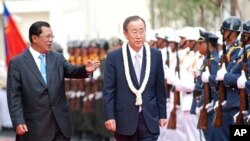Camdodia's prime minister says the four former Khmer Rouge leaders awaiting trial next year would be the last to be prosecuted.
Unilateral decision
Hun Sen put not one, but two, shots across the bow of the United Nations, during a meeting with U.N. Secretary-General Ban Ki-moon, who arrived late Tuesday on a two-day official visit.
The first shot was that he was against allowing the international war crimes court in Phnom Penh to prosecute any more former Khmer Rouge members.
The court is a hybrid U.N.-Cambodian tribunal, funded mainly by donations from U.N. member states.
The second shot - the prime minister wants the United Nations to shut its local human rights office, after firing the office's country head, Christophe Peschoux.
UN reaction
Ban is not scheduled to speak to the media until Thursday, but his spokesman, Yves Sorokobi spoke to VOA.
He says matters of staffing are purely the preserve of the United Nations, and the organization stands by all of its staff, including Peschoux. But when it comes to the matter of the office itself, that is a matter of bilateral cooperation. And that means if Cambodia no longer wants a U.N. human rights office, then in the long term there is not much the United Nations can do about that.
"This has been a matter of bilateral cooperation," noted Sorokobi. "The secretary-general in his meeting with the prime minister today discussed this matter. There was no decision made there by the secretary-general, and I believe that now that the government has made its position clear, the secretary-general will consult."
Tribunal's work
The Khmer Rouge tribunal began its work in 2006, and earlier this year sentenced Kaing Guek Eav, also known as Comrade Duch, the defendant in the first case, to 30 years for war crimes and crimes against humanity.
It is scheduled to begin the second case, against four former leaders of the movement next year.
International investigators had opened dockets into another five unnamed former Khmer Rouge, and those five constituted Cases Three and Four.
But today Prime Minister Hun Sen effectively shot those down.
Reasoning behind decision
Minister of Information Khieu Kanharith told VOA that Hun Sen is against those cases for several reasons.
He says the prime minister believes those being investigated were not high-ranking members in the Khmer Rouge and their prosecutions would fall outside the deal between the United Nations and Cambodia to establish a tribunal in the first place.
"The second reason [is] he said that the primary goal of setting up this court, is first to find justice for the Cambodian people, and two is to preserve the peace and political stability in the country," Kanharith said.
Despite the prime minister's declaration the second trial will be the last, Sorokobi says the United Nations stands committed to the idea of judicial independence at the court.
"Again, this is a matter for the court officials, for the independent councilors to decide, and we have to give them the space that they need to make the proper decision. There should be no political interference with their work," Sorokobi said.
Accountability
Later, Mr. Ban told the staff at the war crimes tribunal headquarters outside Phnom Penh he is firmly resolved those kinds of acts the Khmer Rouge is accused of should never happen again.
He said accountability, justice and the fight against impunity were the standards during his tenure as secretary-general.
Cambodian Premier says No More Khmer Rouge Trials




